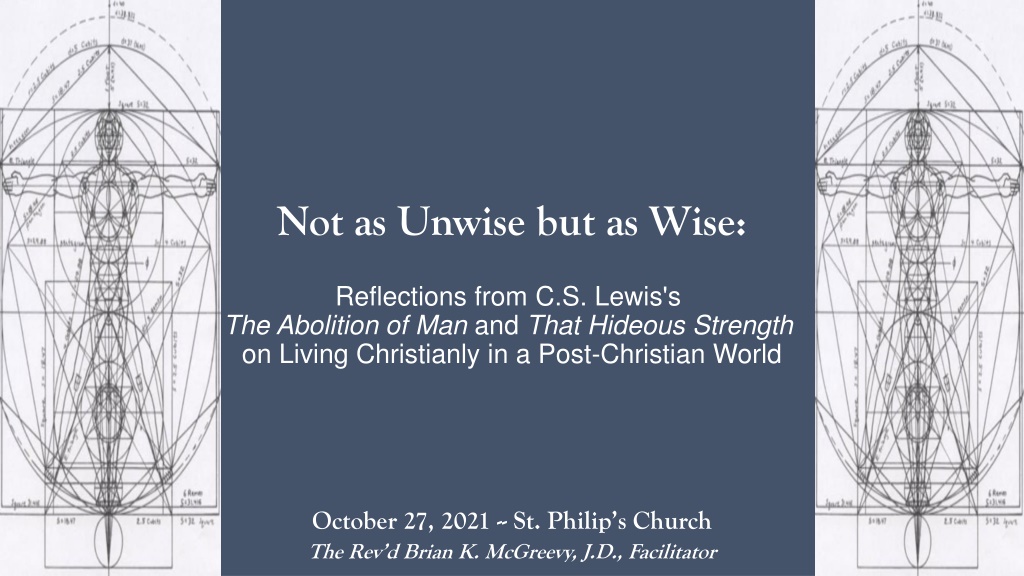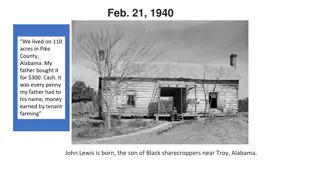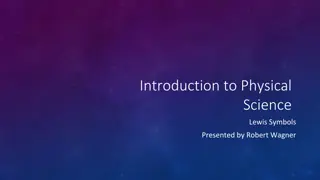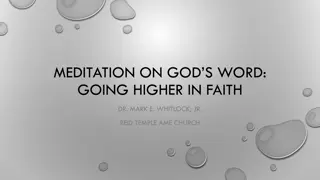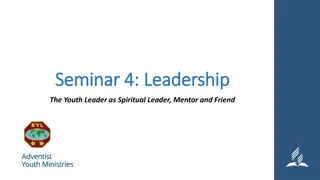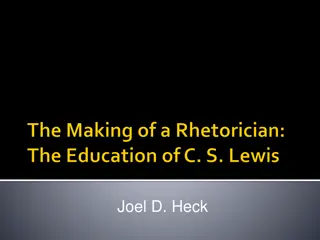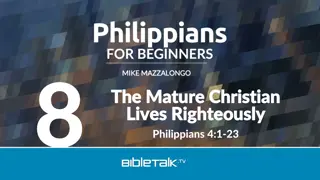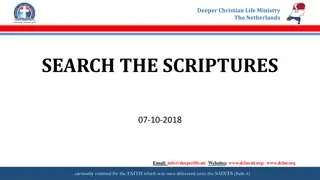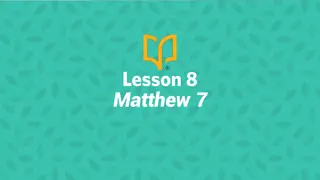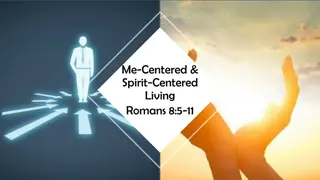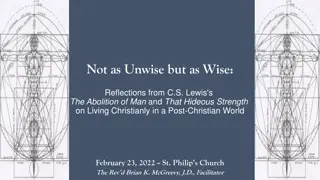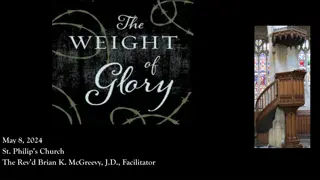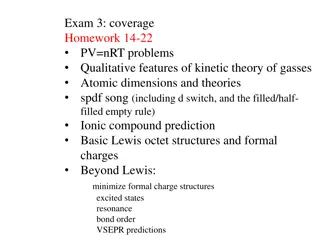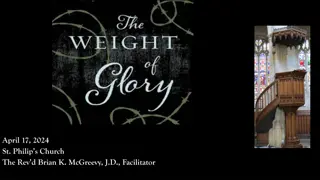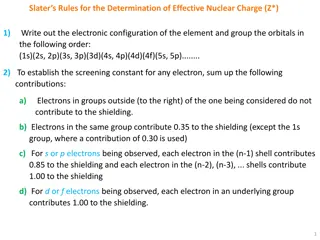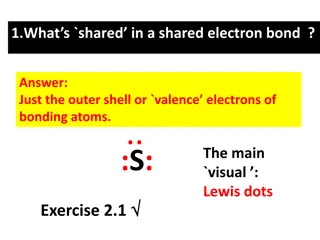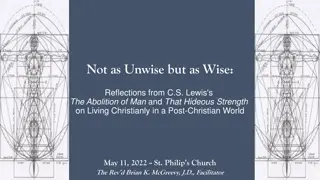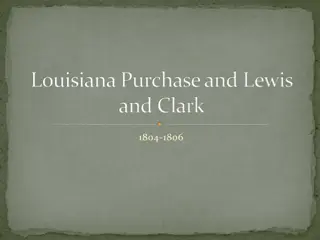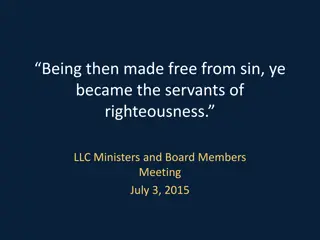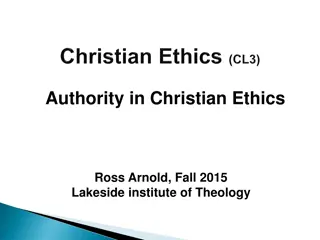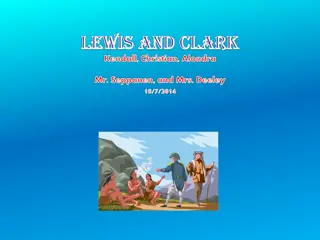Living Wisely in a Post-Christian World: Insights from C.S. Lewis
Dive into the profound teachings of C.S. Lewis as we explore reflections from "The Abolition of Man" and "That Hideous Strength." Discover the essence of living Christianly in a post-Christian era through meaningful discussions and practical applications rooted in wisdom and hope.
Download Presentation

Please find below an Image/Link to download the presentation.
The content on the website is provided AS IS for your information and personal use only. It may not be sold, licensed, or shared on other websites without obtaining consent from the author. Download presentation by click this link. If you encounter any issues during the download, it is possible that the publisher has removed the file from their server.
E N D
Presentation Transcript
Not as Unwise but as Wise: Reflections from C.S. Lewis's The Abolition of Man and That Hideous Strength on Living Christianly in a Post-Christian World October 27, 2021 -- St. Philip s Church The Rev d Brian K. McGreevy, J.D., Facilitator
For at one time you were darkness, but now you are light in the Lord. Walk as children of light (for the fruit of light is found in all that is good and right and true), and try to discern what is pleasing to the Lord. Take no part in the unfruitful works of darkness, but instead expose them. For it is shameful even to speak of the things that they do in secret. But when anything is exposed by the light, it becomes visible, for anything that becomes visible is light. Therefore it says, Awake, O sleeper, and arise from the dead, and Christ will shine on you. Look carefully then how you walk, not as unwise but as wise, making the best use of the time, because the days are evil. Therefore do not be foolish, but understand what the will of the Lord is. Ephesians 5: 8-17
How to approach this class: --On the beach --Snorkeling --Scuba diving --Email list How to read The Abolition of Man: --Why it s not an easy read original audience and the premises of Natural Law --Try reading aloud --One paragraph at a time What we ll be doing each week: --Examining context and establishing a framework for appreciating these books --Unpacking the meaning of Lewis s works --Exploring their relevance for today --Considering how we can respond with practices of Hope and of Wisdom rooted in the Scriptures
Review from previous classes: I. How did C.S. Lewis come to write these two books, what was the context, and how are these two books connected? --C.S. Lewis and how his background prepared him for writing these books: converted atheist, philosopher --The role of the Inklings and Tolkien in conceiving these books --Context of England at War --The Wager --The Riddell Memorial Lectures --Connections between the books In the preface to That Hideous Strength, Lewis states, This is a tall story [pun probably intended] about devilry, though it has behind it a serious point which I have tried to make in my Abolition of Man. II. Education and its fundamental importance for how we view the world --Liberal Arts: Trivium (grammar, logic, and rhetoric) and the Quadrivium (mathematics, geometry, music, and astronomy), seeking to inculcate Virtue. In the Middle Ages, with the advent of universities, Theology (queen of sciences) was the framework for the liberal arts, while philosophy, history, and classical languages and literature (known as the humanities) were added to the traditional liberal arts --St. Augustine: wrote that part of the answer to the despair of skepticism is found in the Christian conviction that Truth is attainable and that knowledge and wisdom are possible, because all Truth derives from God in His creation and His Law, perfectly revealed in Jesus Christ. In City of God, Augustine defined virtue as rightly ordered love (City of God, XV.23), stating in one work: But living a just and holy life requires one to be capable of an objective and impartial evaluation of things: to love things, that is to say, in the right order, so that you do not love what is not to be loved, or fail to love what is to be loved, or have a greater love for what should be loved less, or an equal love for things that should be loved less or more, or a lesser or greater love for things that should be loved equally. (On Christian Doctrine, I.27-28)
The foundational distinction between traditional education and modern education is that the ancients believed that education was fundamentally about shaping loves. The liberal arts [are] a central part of a larger and more robust paradigm of classical education that holistically cultivated the mind, body, will, and affections. (Jain and Clark) Universities and the Liberal Arts Education, and particularly higher education, was part and parcel of the mission of the Church from its earliest days. Universities were unknown in the ancient world and only came into being because the Church started them. What we think of as the great universities like Oxford and Harvard were robustly Christian in their original mission statements. Pragmatism was a philosophical movement in the 19th century which hugely impacted the philosophy of education and its purpose, pushing a utilitarian and economic view of education as about jobs and social reform. The assumption seems to be that the purpose of education is to induce correct opinion rather than to search for wisdom and to liberate the mind. Benno Schmidt, President of Yale University, 1991 Whatever Happened to Philosophy? Philosophy was considered THE most important part of education, and was invariably a required part of university studies answering these questions was the real WHY people went to college. However, over the past 50 years the study of philosophy has shrunk, first being subsumed into a required Western Civilization course, then made optional, and then disdained as IMPRACTICAL (won t help you get a job), politically incorrect, and harmful (Patriarchy of Dead White Men). Up until the early 20th century, if you were a university- educated person, you more than likely would have studied philosophy and would have read Aristotle s Nicomachean Ethics, Plato s Republic, and Augustine s City of God. Who s Afraid of Epistemology? (and Metaphysics) and why you need to know these words: Epistemology is the branch of philosophy which studies the nature and scope of knowledge and justified belief. It considers the relationship between knowledge, truth, belief, reason, evidence, and reliability. Metaphysics is the branch of philosophy which studies being, the nature of existence and reality. So he sent the word to slay/And slew the little childer Surely it must have been a kind of macabre joke on Lewis s part to preface a critique of textbooks with these lines? But no: Herod could but kill the body; our teachers (Lewis thinks) are killing our children s souls, and this is the more grievous sin. Lewis scholar Alan Jacobs
MEN WITHOUT CHESTS Gaius, Titius, and The Green Book Coleridge and the Waterfall: A Deliberate Starting Point Lewis adapts a story from a memoir by Dorothy Wordsworth, recounting a trip she took in 1803 with her brother, William Wordsworth, and his good friend Samuel Taylor Coleridge. Characteristics of Waterfalls and the Biblical Idea of Living Water -- They have forsaken me, the spring of living water, and have dug their own cisterns, cisterns that cannot hold water Jeremiah 2:13 LEWIS BELIEVES THAT BEAUTY IS A REAL, OBJECTIVE VALUE WHICH WE CAN BE TAUGHT TO RECOGNIZE AND TO LOVE. Augustine s On Christian Doctrine:: Living a just and holy life requires one to be capable of an objective and impartial evaluation of things: to love things, that is to say, in the right order. In this enduringly influential book, Lewis defends the objectivity of value, pointing to the universal moral ecology that all great philosophical and religious traditions have acknowledged as self-evident. Though Lewis writes as an apologist for Christianity in many of his other works, he here constructs his argument on purely philosophical grounds, making an anthropological claim, not advancing a theological case. Objective value, he maintains, is humanity s ethical inheritance, which we can extend and develop but may not properly escape. Insofar as we try to deny or subvert this way of being moral, we make ourselves (and those whom we raise or teach or otherwise influence) essentially less than human. We produce men without chests, or in other words, people who have no stable heart, no reliable capacity to liaise between intellect and appetite, no ability to distinguish between what is good in itself and what is good for them. Right thus dissolves into might, and sheer willpower takes the place of reason The result is the erasure of our own true identity, the abolition of man. Rev. Dr. Michael Ward
To help us unpack the major themes of this chapter, we are going to use the analysis developed by Lewis scholar and Christian philosopher Dr. Davey Naugle, who identifies eight key themes in Men Without Chests 1: Miseducation cutting out the soul through the poison of subjectiyism 2: Uncultivated souls---producing trousered apes shorn clean of traditional values and noble sentiments 3: Rationale --debunking is easier than scholarly critique, misbeliefs about emotivism, rejecting objective moral value 4: Objective moral values--Lewis offers a survey of representatives from Western and world sources who advocate the objective, universal, timeless principles and truths, or what Lewis calls the Tao(Chinese for The Way ) 5: Education inside or outside the Tao-- Lewis points out that it makes all the difference in the world if education proceeds inside or outside the Tao. The difference is between initiation into the universal human heritage of objective values or conditioning to a new, subjective set of practical values by which people are manipulated pawns 6: Trained emotions Without the aid of trained emotions, the intellect or mind which knows what to do is powerless against the animal organism. Only as the Chest, the seat of emotions and sentiments, is rightly trained to respond in accordance with objective moral values, will it be able to control the baser appetites of the Belly. 7: Men without chests The head rules the belly through the chest the seat . . . of emotions organized by trained habit into stable sentiments . . . these are the indispensable liaison officers between cerebral man and visceral man. It may even be said that it is by this middle element that man is man: for by his intellect he is mere spirit and by his appetite mere animal. 8: Moral irony Given the moral collapse of our culture, we clamour for the qualities that we make it impossible to obtain we remove the organ but demand the function.
While the nature of emotional responses is partly visceral and automatic, a mans sentiments also have to be intentionally educated in order to be congruent to be more in harmony with Nature. Such training teaches a man to evaluate things as more or less Just, True, Beautiful, and Good, and to proportion his affections as merited. The Tao of Sentiment (from The Art of Manliness Podcast, August 21, 2021) Eustace Scrubb, Experiment House, and education Eustace had read all the wrong books! Unpacking Lewis s Imagery in Men Without Chests Shelley s Aeolian Harp(It is as if the lyre could accommodate its chords to the motions of that which strikes them, in a determined proportion of sound; even as the musician can accommodate his voice to the sound of the lyre. Thomas Traherne (Can you accomplish the end for which you were created, unless you be Righteous, unless you be just in rendering to Things their due esteem? All things were made to be yours, and you were made to prize them according to their value.) St. Augustine s ordo amoris Love itself is to be ordinately loved, because we do well to love that which, when we love it, makes us live well and virtuously. Aristotle (the aim of education in to make the pupil love what he ought) Plato( The well-nurtured youth is one who would with a just distaste would blame and hate the ugly and would give delighted praise to beauty so that he became a man of gentle heart. ) Hinduism s Rta: (The Truth, which informs and orders the universe and human society) Chinese Tao: (That to which all things in heaven and earth must conform) Jewish law: ( all His commandments are True ) Orbilius and Dr. I.A. Richards
Another Lens: The Abolition of Mans argument as expressed in Mere Christianity Book I. Right and Wrong as a Clue to the Meaning of the Universe: The Law of Human Nature A. Quarreling and what people say B. Appeal to a standard of behavior which is generally agreed upon C. The Law of Nature and the Law of Human Nature: humans are subject to multiple natural laws but are only free to disobey one D.Idea of decent behavior is obvious to all because Right is a real thing E. Morality and moral teaching are remarkably consistent across ages and civilizations F. Those who say they do not believe in a real Right or Wrong will nevertheless appeal to a standard of fairness if things do not go their way G. Right and Wrong are no more matters of taste or opinion than the multiplication tables, yet no one is successfully and consistently keeping the Law of Nature H. We have failed to practice ourselves the kind of behavior we expect from other people I. Two key points: humans know the Law of Nature; they break it
Philosophers and Ideologues Opposed to Lewiss Idea of Objective Value Friedrich Wilhelm Nietzsche (1844-1900) German philosopher who is known as the father of Nihilism. Nietzsche sought to free human beings from their false consciousness about Morality (their false belief that morality is good for them). Nihilism is the belief that all values are baseless and that nothing can be known or communicated. It is often associated with extreme pessimism and a radical skepticism that condemns existence. A true nihilist would believe in nothing, have no loyalties, and no purpose other than, perhaps, an impulse to destroy. While few philosophers would claim to be nihilists, nihilism is most often associated with Nietzsche, who argued that its corrosive effects would eventually destroy all moral, religious, and metaphysical convictions and precipitate the greatest crisis in human history. Since the 20th century, nihilistic themes epistemological failure, value destruction, and cosmic purposelessness have preoccupied artists, social critics, and philosophers. Internet Encyclopedia of Philosophy Jacques Derrida (1930-2004)French philosopher influenced by Nietzsche, known for his theory of Deconstruction. --Western thought and language have always had a fixed centre in absolute truth, which limits what it is possible to think or believe. Absolute Truth provides certainties, a foundation for being (what we are) and for knowing (how we think). --Derrida s underlying assumption is that there is no God in the equation to guarantee such absolutes, and hence ideas about certainty are now ruptured. The idea of a fixed centre was only a structure of power imposed on us by our past or by institutions of society, but in reality such a fixed centre does not exist at all. --Therefore, there is no ultimate reality, no God outside the system to which everyone and everything relates. Instead the only relationships that we can know are within the system of the world which Derrida calls discourses. For him ultimate reality is only a series of these discourses. --Because there is no fixed centre, there should no longer be any limits on what it is possible to think or believe. Truth and falsehood are simply wrong distinctions to make. Indeed they are just a destructive and harmful manifestation of that power structure. Therefore we must stop considering everything in life, culture and thought in relation to absolute truth, because to do so is, for Derrida, oppressive and immoral. adapted from English scholar Marcus Honeysett
Philosophers and Ideologues Opposed to Lewiss Idea of Objective Value (continued) Michel Foucault (1926-1984) French philosopher and public intellectual. Foucault argued that knowledge and power are intimately connected. So much so, that that he coined the term power/knowledge to point out that one is not separate from the other. Every exercise of power depends on a scaffold of knowledge that supports it. Claims to knowledge advance the interests and power of certain groups while marginalising others. In practice, this often legitimises the mistreatment of these others in the name of correcting and helping them. Where there is power, there is also always resistance: sites of resistance that hold out the promise for a reconfiguring of power relations in a way that might redress oppressive institutions and practices.Foucault s beliefs are founded on Nietzsche s premise that there are no moral facts whatever Moral judgement has this in common with religious judgement - that it believes in realities which do not exist. Foucault also argued for the concept of self-creation. In this view, the self is no longer considered as the passive product of an external system of constraint and prescriptions, but as the active agent of its own formation: we can be freer by creating ourselves anew. adapted from Dr. John Coffey, Cambridge University Note that later in the 20th century Derrida and Foucault write and argue for exactly the positions that Lewis anticipates in The Abolition of Man, which was written in 1943, decades before Derrida and Foucault became known. Through their theories, Derrida and Foucault have transformed virtually every discipline in the academic world, fulfilling Lewis s prophecies. Through its vehement opposition to logocentrism (the belief that there is a realm of truth that exists prior to and independently of its representation by linguistic and other signs), Deconstructionism robs the world of meaning and wonder. Lewis foresaw this possibility and was appalled by it, as shown in this poignant passage from The Voyage of the Dawn Treader when Eustace Scrubb talks with Ramandu, a star from the heavens: In our world, said Eustace, a star is a huge ball of flaming gas. -- Even in your world, my son, that is not what a star is but only what it is made of. Solar system analogy from Lewis scholar Dr. Joe Rigney
Chapter 2: The Way It is upon the trunk that a gentleman works--Confucius By working on the trunk, the chest, the liaison officer between our heads and our bellies we become integrated wholes and so learn the wholesome way of being human in the world. Lewis uses the Tao not because he wants to single out Chinese philosophy as uniquely insightful but in order to de-emphasize Western categories and to remind his readers that moral reality is universal. Rev. Dr. Michael Ward, After Humanity Not No Values but Whose Values? The practical result of education in the spirit of The Green Book must be the destruction of the society which accepts it. However subjective they may be about some traditional values, Gaius and Titius have shown by the very act of writing The Green Book that there must be some other values about which they are not subjective at all. They write in order to produce certain states of mind in the rising generation, if not because they think those states of mind intrinsically just or good, yet certainly because they think them to be the means to some state of society which they regard as desirable . Their scepticism about values is on the surface: it is for use on other people s values; about the values current in their own set they are not nearly sceptical enough. .. The Innovator Let us suppose that an Innovator in values regards dulce et decorum and greater love hath no man as mere irrational sentiments which are to be stripped off in order that we may get down to the realistic or basic ground of this value. Where will he find such a ground? First of all, he might say that the real value lay in the utility of such sacrifice to the community. Good , he might say, means what is useful to the community. From propositions about fact alone no practical conclusion can ever be drawn. This will preserve society cannot lead to do this except by the mediation of society ought to be preserved. This will cost you your life cannot lead directly to do not do this: it can lead to it only through a felt desire or an acknowledged duty of self-preservation. The Innovator is trying to get a conclusion in the imperative mood out of premisses in the indicative mood: and though he continues trying to all eternity he cannot succeed, for the thing is impossible
Argument from Instinct: The preservation of society, and of the species itself, are ends given by Instinct. We have an instinctive urge to preserve our own species. That is why men ought to work for posterity. We have no instinctive urge to keep promises or to respect individual life: that is why scruples of justice and humanity in fact the Tao can be properly swept away when they conflict with our real end, the preservation of the species. Lewis s Response: I will not insist on the point that Instinct is a name for we know not what (to say that migratory birds find their way by instinct is only to say that we do not know how migratory birds find their way), for I think it is here being used in a fairly definite sense, to mean an unreflective or spontaneous impulse widely felt by the members of a given species. But the very question we are considering was that of facing death which (so far as the Innovator knows) cuts off every possible satisfaction [because he does not believe in an afterlife]: and if we have an instinctive desire for the good of posterity then this desire, by the very nature of the case, can never be satisfied, since its aim is achieved, if at all, when we are dead. It looks very much as if the Innovator would have to say not that we must obey Instinct, nor that it will satisfy us to do so, but that we ought to obey it. From the statement about psychological fact I have an impulse to do so and so we cannot by any ingenuity derive the practical principle I ought to obey this impulse . Choosing among Instincts: If we did not bring to the examination of our instincts a knowledge of their comparative dignity, we could never learn it from them. And that knowledge cannot itself be instinctive: the judge cannot be one of the parties judged; or, if he is, the decision is worthless and there is no ground for placing the preservation of the species above self-preservation or sexual appetite . It is of no avail. Either these words conceal a value judgement passed upon the instinct and therefore not derivable from it, or else they merely record its felt intensity, the frequency of its operation and its wide distribution The truth finally becomes apparent that neither in any operation with factual propositions nor in any appeal to instinct can the Innovator find the basis for a system of values. The Inexorable Tao: None of the principles he requires are to be found there: but they are all to be found somewhere else. All within the four seas are his brothers (xii. 5) says Confucius of the Ch n-tzu, the cuor gentil or gentleman. Humani nihil a me alienum puto [I am a human: I regard nothing human as foreign to me]says the Stoic. Do as you would be done by, says Jesus. Humanity is to be preserved, says Locke. All the practical principles behind the Innovator s case for posterity, or society, or the species, are there from time immemorial in the Tao. But they are nowhere else.,
Bootstrapping: The Innovator attacks traditional values (the Tao) in defence of what he at first supposes to be (in some special sense) rational or biological values. But as we have seen, all the values which he uses in attacking the Tao, and even claims to be substituting for it, are themselves derived from the Tao. If he had really started from scratch, from right outside the human tradition of value, no jugglery could have advanced him an inch towards the conception that a man should die for the community or work for posterity. If the Tao falls, all his own conceptions of value fall with it. Not one of them can claim any authority other than that of the Tao. Only by such shreds of the Tao as he has inherited is he enabled even to attack it. Pick and Choose? The question therefore arises what title he has to select bits of it for acceptance and to reject others. For if the bits he rejects have no authority, neither have those he retains: if what he retains is valid, what he rejects is equally valid too . He may be a Jingoist, a Racialist, an extreme nationalist, who maintains that the advancement of his own people is the object to which all else ought to yield. But no kind of factual observation and no appeal to instinct will give him a ground for this option. Once more, he is in fact deriving it from the Tao: a duty to our own kin, because they are our own kin, is a part of traditional morality. But side by side with it in the Tao, and limiting it, lie the inflexible demands of justice, and the rule that, in the long run, all men are our brothers. Whence comes the Innovator s authority to pick and choose? Conclusions: Since I can see no answer to these questions, I draw the following conclusions. This thing which I have called for convenience the Tao, and which others may call Natural Law or Traditional Morality or the First Principles of Practical Reason or the First Platitudes, is not one among a series of possible systems of value. It is the sole source of all value judgements. If it is rejected, all value is rejected. If any value is retained, it is retained. The effort to refute it and raise a new system of value in its place is self-contradictory. There has never been, and never will be, a radically new judgement of value in the history of the world. What purport to be new systems or (as they now call them) ideologies , all consist of fragments from the Tao itself, arbitrarily wrenched from their context in the whole and then swollen to madness in their isolation, yet still owing to the Tao and to it alone such validity as they possess. The rebellion of new ideologies against the Tao is a rebellion of the branches against the tree: if the rebels could succeed they would find that they had destroyed themselves.
New Values?The human mind has no more power of inventing a new value than of imagining a new primary colour, or, indeed, of creating a new sun and a new sky for it to move in A theorist about language may approach his native tongue, as it were from outside, regarding its genius as a thing that has no claim on him and advocating wholesale alterations of its idiom and spelling in the interests of commercial convenience or scientific accuracy. That is one thing. A great poet, who has loved, and been well nurtured in, his mother tongue , may also make great alterations in it, but his changes of the language are made in the spirit of the language itself: he works from within. The language which suffers, has also inspired the changes. That is a different thing as different as the works of Shakespeare are from Basic English. It is the difference between alteration from within and alteration from without: between the organic and the surgical. Within or Without the Tao: In the same way, the Tao admits development from within. There is a difference between a real moral advance and a mere innovation. From the Confucian Do not do to others what you would not like them to do to you to the Christian Do as you would be done by is a real advance. The morality of Nietzsche is a mere innovation. the Nietzschean ethic can be accepted only if we are ready to scrap traditional morals as a mere error and then to put ourselves in a position where we can find no ground for any value judgements at all. It is the difference between a man who says to us: You like your vegetables moderately fresh; why not grow your own and have them perfectly fresh? and a man who says, Throw away that loaf and try eating bricks and centipedes instead. Those who understand the spirit of the Tao and who have been led by that spirit can modify it in directions which that spirit itself demands. Only they can know what those directions are. The outsider knows nothing about the matter. His attempts at alteration, as we have seen, contradict themselves. So far from being able to harmonize discrepancies in its letter by penetration to its spirit, he merely snatches at some one precept, on which the accidents of time and place happen to have riveted his attention, and then rides it to death From within the Tao itself comes the only authority to modify the Tao. This is what Confucius meant when he said With those who follow a different Way it is useless to take counsel . This is why Aristotle said that only those who have been well brought up can usefully study ethics: to the corrupted man, the man who stands outside the Tao, the very starting point of this science is invisible . Only those who are practising the Tao will understand it. It is the well-nurtured man, the cuor gentil, and he alone, who can recognize Reason when it comes. It is Paul, the Pharisee, the man perfect as touching the Law who learns where and how that Law was deficient.
The End: No Values at All: Yet how can the modern mind be expected to embrace the conclusion we have reached? This Tao which, it seems, we must treat as an absolute is simply a phenomenon like any other the reflection upon the minds of our ancestors of the agricultural rhythm in which they lived or even of their physiology. We know already in principle how such things are produced: soon we shall know in detail: eventually we shall be able to produce them at will. Of course, while we did not know how minds were made, we accepted this mental furniture as a datum, even as a master. But many things in nature which were once our masters have become our servants. Why not this? Why must our conquest of nature stop short, in stupid reverence, before this final and toughest bit of nature which has hitherto been called the conscience of man? You threaten us with some obscure disaster if we step outside it: but we have been threatened in that way by obscurantists at every step in our advance, and each time the threat has proved false. You say we shall have no values at all if we step outside the Tao. Very well: we shall probably find that we can get on quite comfortably without them. Let us regard all ideas of what we ought to do simply as an interesting psychological survival: let us step right out of all that and start doing what we like. Let us decide for ourselves what man is to be and make him into that: not on any ground of imagined value, but because we want him to be such. Having mastered our environment, let us now master ourselves and choose our own destiny This is a very possible position: and those who hold it cannot be accused of self- contradiction like the half-hearted sceptics who still hope to find real values when they have debunked the traditional ones. This is the rejection of the concept of value altogether.
Practices of Hope and of Wisdom Finally, brothers, whatever is true, whatever is honorable, whatever is just, whatever is pure, whatever is lovely, whatever is commendable, if there is any excellence, if there is anything worthy of praise, think about these things.What you have learnedand received and heard and seen in me practice these things, and the God of peace will be with you. Philippians 4:8-9 1. Go for a slow walk somewhere beautiful and consider the beauty of nature, noticing the light and the breeze and the scents, and spend some time in a prayer of thanksgiving 2. Meditate on Psalm 8 and Psalm 19, and consider memorizing parts of the text 3. Listen to podcast on Tolkien s poem Mythopoeia and read the poem aloud (if you are a scuba diver, also read Tolkien s essay On Fairy Stories ) 4. Listen to Bainton s And I Saw a New Heaven while reading the text from Revelation 21 and be encouraged about our final destiny in Christ 5. Contemplate the last stanzas of T.S. Eliot s Little Gidding (or read the whole poem if you are a scuba diver) With the drawing of this Love and the voice of this Calling We shall not cease from exploration And the end of all our exploring Will be to arrive where we started And know the place for the first time. Through the unknown, unremembered gate When the last of earth left to discover Is that which was the beginning; At the source of the longest river The voice of the hidden waterfall And the children in the apple-tree Not known, because not looked for But heard, half-heard, in the stillness Between two waves of the sea. Quick now, here, now, always-- A condition of complete simplicity (Costing not less than everything) And all shall be well and All manner of thing shall be well When the tongues of flames are in-folded Into the crowned knot of fire And the fire and the rose are one.
For at one time you were darkness, but now you are light in the Lord. Walk as children of light (for the fruit of light is found in all that is good and right and true), and try to discern what is pleasing to the Lord. Take no part in the unfruitful works of darkness, but instead expose them. For it is shameful even to speak of the things that they do in secret. But when anything is exposed by the light, it becomes visible, for anything that becomes visible is light. Therefore it says, Awake, O sleeper, and arise from the dead, and Christ will shine on you. Look carefully then how you walk, not as unwise but as wise, making the best use of the time, because the days are evil. Therefore do not be foolish, but understand what the will of the Lord is. Ephesians 5: 8-17
